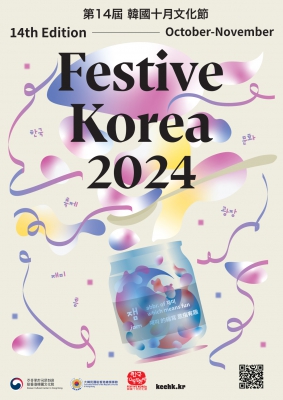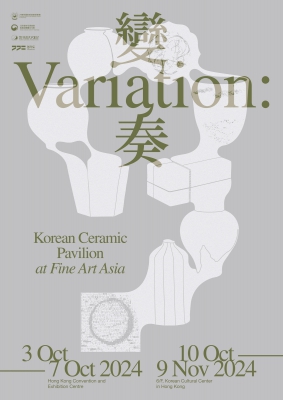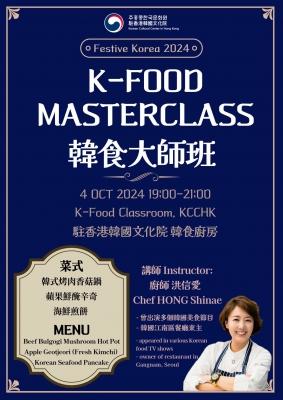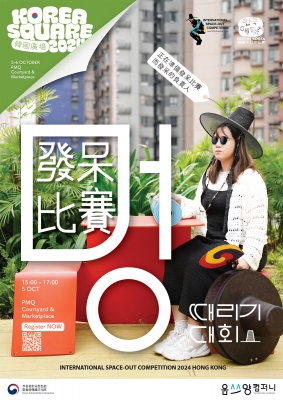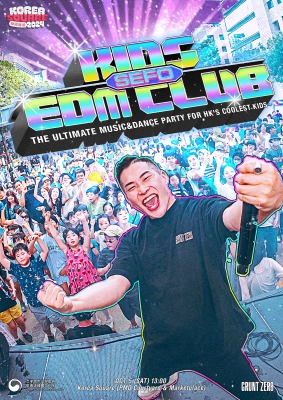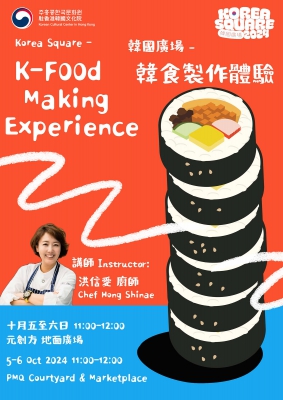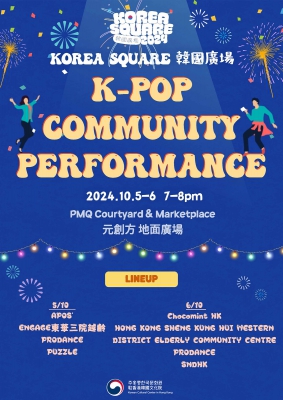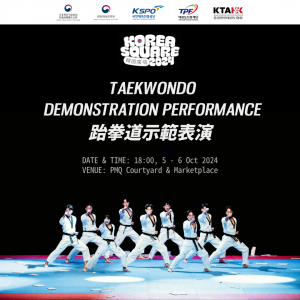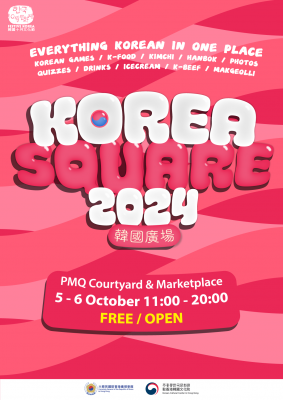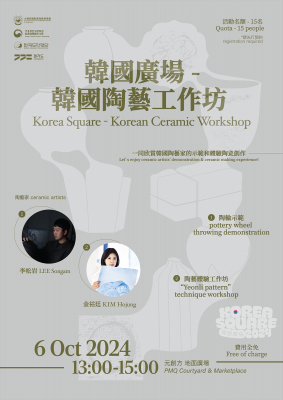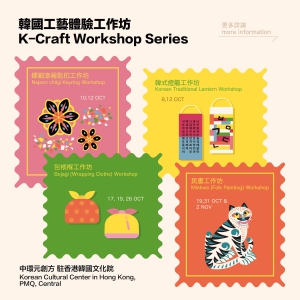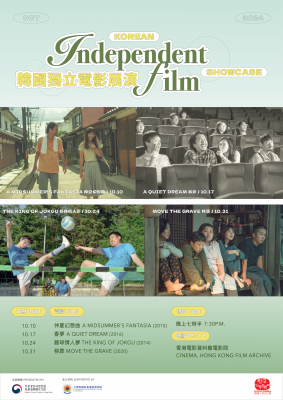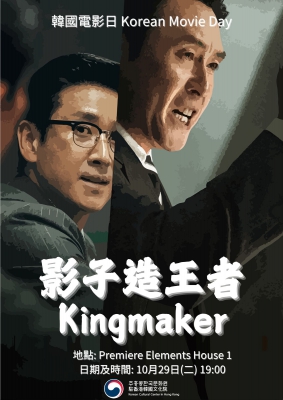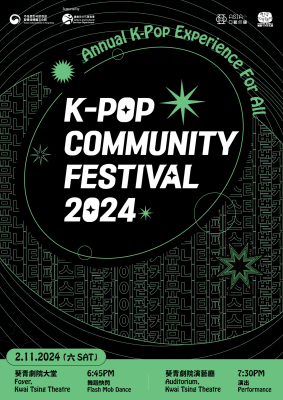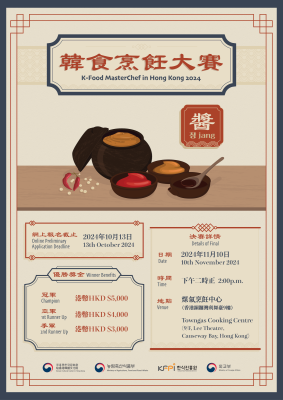

Korean Culture Lecture Series (Festive Korea 2024)Korean Cultural Center in Hong Kong
The Korean Cultural Center in Hong Kong will host a series of Korean cultural talks from October to November, aiming to promote public understanding and appreciation of Korean culture. This lecture series will bring together several experts in the field of Korean culture, including Korean culture and travel book author Joyce Cheuk, Korean cultural researcher and writer Cyrus Ng, Assistant Professor Dr. Koh Keumseok from the Department of Geography at the University of Hong Kong, and Assistant Professor Dr. Lee Sangjoon from the School of Creative Media at City University of Hong Kong.
The talks will cover various topics, including but not limited to studying abroad in Korea, Korean food culture, the success of Hallyu ( the Korean Wave ), and the rise and fall of the ""Hong Kong film craze"" in Korea, allowing participants to gain a multifaceted understanding of Korean culture.
*Korean snacks & drinks will be served
[2024-10-12/ 15:30-17:00] 釜山都市再生之旅:傳統與現代的交融 (講者:卓惠媛 Joyce Cheuk)*以廣東話進行
釜山,一個兼具歷史底蘊與現代魅力的城市,如何透過都市再生計劃實現傳統文化與創新設計的完美結合?本次講座將帶您深入了解釜山的歷史變遷與現代化進程,和都市更新過程中社區參與和創意產業的發展,從文化觀光的角度和釜山都市再生的案例,探索都市再生中的文化創意,並發掘釜山這座城市的新魅力,來一場釜山文化旅行。
[2024-10-19/ 17:30-19:00] 韓國遊(留)學、韓語學習 深入體驗韓國文化
(講者:卓惠媛 Joyce Cheuk)*以廣東話進行
近年來,越來越多人對韓國文化和韓語學習產生濃厚興趣,從工作假期、短期興趣課程、語學堂到大學和研究院的深入進修,選擇多元豐富。本次講座將淺談工作假期、短期興趣課程、韓國語學堂進修、韓國升學路徑及相關職業發展,分享不同選擇的具體生活安排和實用小貼士。不限年齡,好好計劃一個專屬的韓國文化探索學習旅程。
[2024-10-23/ 19:00-20:30] 探尋韓國飲食文化(講者:卓惠媛 Joyce Cheuk)*以廣東話進行
韓國飲食文化—韓食,已成為全球的美食潮流之一。在韓國的餐桌上,食材和菜餚因四季變換、節氣循環、地區特色、氣候差異及人文風俗等因素而各具風味。韓食的原型蘊含豐富的文化意涵和深厚的歷史淵源,如南北不同風味的麵食、各地獨具特色的豬肉湯飯做法、宮廷飲食與地方韓定食的獨特之處,無不展現出韓食與韓國土地的緊密連結。本次講座將結合多年在韓國各地的採訪經驗,按著韓國地圖娓娓道來韓食料理的迷人故事,並特別分享講者的私房推薦,助您在下一次韓國之旅中,更好地品味地道美食。
[2024-11-2/ 17:00-18:30] 韓流文化王國的崛起(講者:伍麒匡Cyrus Ng)*以廣東話進行
韓流於近年成為領先於全亞洲的文化工業,但冰封三尺,非一日之寒,成功的背後是經過政府與大財團的各種嘗試與努力,才能建立日趨龐大的文化王國。從何時起受啟發要決心發展文化產業,還有什麼契機打動財團投資於文化上,是了解韓流最必要的議題。
[2024-11-9/ 14:00-15:30] 韓流的成功之道(講者:伍麒匡Cyrus Ng)*以廣東話進行
雖說有政府及財團支持發展文化產業,但始終最影響成績的就是受眾數量。不同地方的觀眾縱使不懂韓國語言仍會著迷於韓流,投資及製作人如何貼近市場需要令韓流的流行永續,甚至成功擴闊觀眾層至全球世界各地?
[2024-10-26/ 17:30-19:00] The 1990s in South Korea: when Generation X listened to and created K-pop ( Speaker: Dr. Koh Keumseok ) *conducted in English
After the turbulent times of transition and industrialization until the 1980s, South Korea entered the 1990s with hopeful aspirations of becoming a developed country. While new social challenges were on the horizon, the optimistic social mood among Koreans was well aligned with their desire for globalization during this decade. In this atmosphere, Generation X in South Korea emerged as active consumers and creators of K-pop and other subcultures. In this talk, Dr. Koh, a Gen-Xer, will share his observations and reflections on Korean culture during the 1990s.
[2024-11-13/ 19:00-20:30] Chelsia, Jackie, and A Better Tomorrow: Hong Kong Syndrome in South Korea, 1977-1992 ( Speaker: Dr. Lee Sangjoon ) *conducted in English
This lecture examines the rise and decline of Hong Kong cinema in South Korea from 1977 to 1992. It highlights the early 1980s successes of stars like Jackie Chan, Yuen Biao, and Sammo Hung, transitioning to the influential gangster films of Chow Yun-fat, Andy Lau, and Leslie Cheung in the mid-1980s. The discussion concludes with the early 1990s' return to wuxia, marking the end of this cultural phenomenon.
You may register up to 2 quotas per registration.
First come first served.


